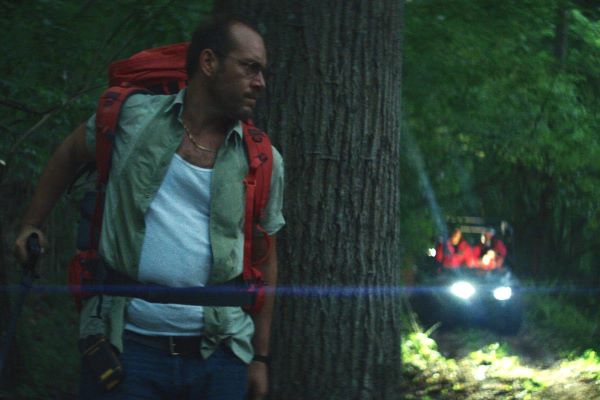Noah Hutton started as a documentarian. One who has previously looked into the social consequences of the oil industry. Social concerns are once again at the forefront of his second fiction feature Lapsis. In this instance, Hutton is taking aim at the technological industry and the harsh realities of the gig economy. It is a sly Black Mirror-esque near-future satire packed with ideas. But it is also one that throws out a lot more questions than it answers in a way that will be entirely too oblique for many.
Ray (Dean Imperial) is a schlubby loser scraping a living returning lost luggage to people. As well as trying to get by he is also trying to raise treatment funds for his ailing half-brother Jamie (Babe Howard). In order to do that, Ray takes a job as a ‘cabler’, new line of work where people hike through miles of deep forest terrain connecting cables to strange metal cubes that link up the new quantum computing trading network.
Early on, the film looks like it will be much more of a cautionary tale about the dangers of technology. Particularly so given Ray is a technophobe who worries about the health effects of this new technology ‘in the air’. However, at its heart, the movie has more human concerns about corporate greed, the exploitation of workers, and people being replaced by machines.
Hutton certainly makes this near-future feel frighteningly real. He quickly establishes the world of the ‘cablers’ and how they are exploited; whether being made to compete against robots or by how an app monitors the workers, always telling them when they can rest or how many loo stops they can have. Or how they can potentially get-rich-quick but only if they take on increasingly dangerous roots. It is a penetrating vision and one that perfectly hits the nerve of our current economically fragile times.
Through the eyes of Ray, we see this world as he quickly finds himself stuck between pursuing his own self-interest and helping out with a potential resistance against this system. He is a wonderfully sad-sack hero who is excellently portrayed by Imperial. He is by far the film’s strongest asset, and it would be much weaker without his stirring performance partly because most of the other characters feel relatively thin. That is with the exception of Anna (Madeline Wise), a fellow ‘cabler’ and part-time investigative journalist, who helps Ray see how he and those around him are being exploited.
There is also a mystery element to the movie centring on a mysterious former ‘cabler’ called Lapsis. This element works less well as while it adds another level of intrigue, it unravels in a frustratingly elliptical way. And sometimes it feels likes it distracts from the plot as much as it adds to it.
For there is a lot packed in here with the movie’s satirical gaze not only taking aim at technology, the gig economy, and corporate malfeasance but the bogus side of the medical industry. This occasionally makes things feel overstuffed. Then again, it is great to see such ambition. And it is much better to see a feature overflowing with ideas than being bereft of them.
If there is another issue, it is pacing. Not throughout the whole film, but there are certainly moments where proceedings sag. This sagging is explicitly down to a large section of the film just following Ray as he walks through the forest. While there are enough incidents and intrigue to make this compelling for the most part (it is also beautifully filmed), there are times where things meander.
Also, there is the fact the movie doesn’t so much end as it simply stops. This leaves several plot threads and questions hanging in the air. But then again, maybe that is the point to provoke thought rather than provide cosy, tidy answers.
Lapsis provides a chilling vision – one that asks tough questions about an ever-growing employment model presented in an engaging manner and anchored by Imperial’s touchingly melancholic performance. And even if it doesn’t entirely hold together, it exhibits that Hutton is a bold filmmaker to keep an eye on.
Available on-demand as part of Fantasia Festival
